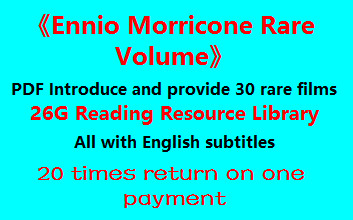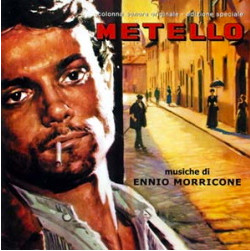METELLO (1970)
Metello is an Italian historical drama film directed by Mauro Bolognini, starring Massimo Ranieri in the title role. It’s the story of how a man struggles to escape from the abject poverty that led to the premature death of his parents – the poverty that defined the working class in northern Italy during the second half of the 19th century. The film follows Metello as he fights his way through the class system inherent in Italian society, working hard but also taking advantage of his good looks when dealing with women; eventually he assumes an important role in a workers movement, but soon finds he must balance his new and risky political activities with his active private life.
The score for Metello, like many Morricone works, is based around two main themes, and several variations thereof. The main theme, “Metello,” is initially heard as a pretty, wistful, intimate melody that moves backwards and forwards between acoustic guitars, woodwinds, solo violins, piano, solo trumpet, and organ in the opening “Tema Titoli”. As then as the score progresses it goes through several variations, including one notable one where the melody is arranged for saxophone, flute, cimbalom, and oboe. It’s a lovely theme, perhaps a little old-fashioned in some of its renaissance-esque chord progressions, but it speaks both to the main character’s humble origins, as well as his aspirations and desire to prove himself. The final statement, in “Titoli Finale – Grande Orchestra,” is really superb, the best cue on the album.
The main secondary theme is “Tema Scioperpo” – the Strike theme – which is a little more dour and serious, and blends woodwinds and cimbalom together to perform a melody that actually feels a little Jewish in tone, as if it is carrying the weary weight of the world on its musical shoulders. The “Solenne Triste” variation is quite striking and dramatic, with more prominent piano and strings, while the “Versione Lunga” passes the melody between numerous different solo instruments over the course of its seven minute length.
There are also some one-off cues of note, including a flamboyant and brassy piece of regal pastiche in “L’Arrivo de Re,” some old-fashioned source music in “Pianino Nella Strada,” and a lively militaristic flurry for trumpet, fife, and drum in “La Naja”.
Metello is not one of Ennio Morricone’s more well-known scores, but the main theme is especially worth seeking out of you like your romantic themes underpinned with a sense of melancholy. The version reviewed here is the one released by GDM Music in 2006, digitally remastered and expanded from previous releases, but as is always the case there are multiple options to choose from, including one from GDM released in 2014 which pairs the score with The Secret of the Sahara as part of a 2-CD set.
Track Listing: 1. Metello (Tema Titoli) (2:44), 2. Tema Sciopero (Andante Triste) (1:58), 3. Pianino Nella Strada (2:15), 4. Metello (Tema Titoli Sax-Flauto-Cembalo-Oboe) (1:49), 5. Tema Sciopero (Solenne Triste) (2:04), 6. Metello (Tema Titoli) (2:19), 7. L’Arrivo del Re (Marcia Militare) (2:37), 8. Tema Sciopero (Versione Lunga) (6:57), 9. Metello (Ripresa) (2:58), 10. La Naja (Marcetta Per Tromba, Ottavino e Tamburo) (1:35), 11. Tema Sciopero (Ripresa) (5:57), 12. Metello (Ripresa #2) (4:04), 13. L’Arrivo del Re #2 (2:45), 14. Metello (Titoli Finale – Grande Orchestra) (2:39). GDM Music GDM-2071, 42 minutes 41 seconds.












